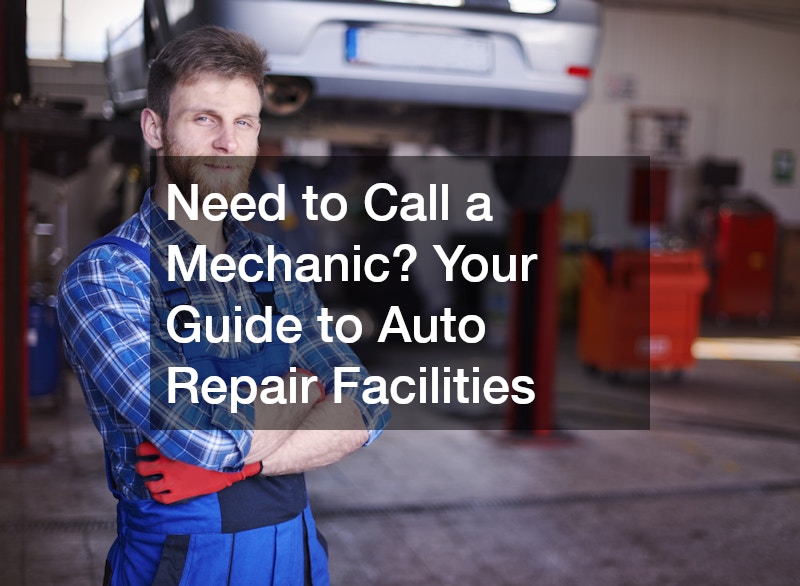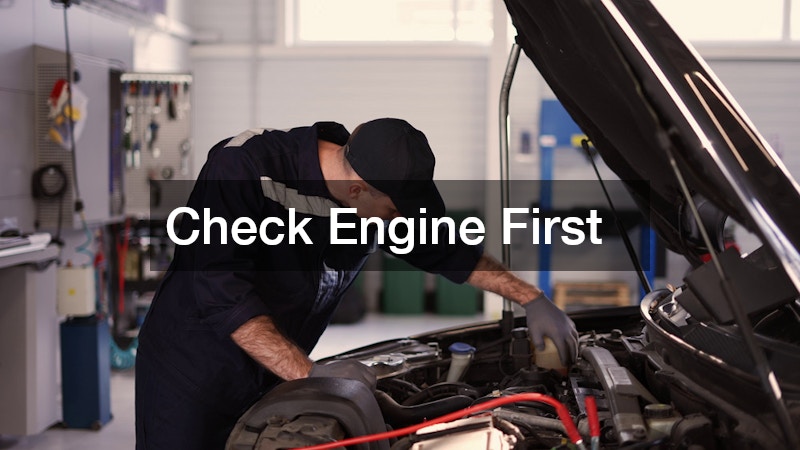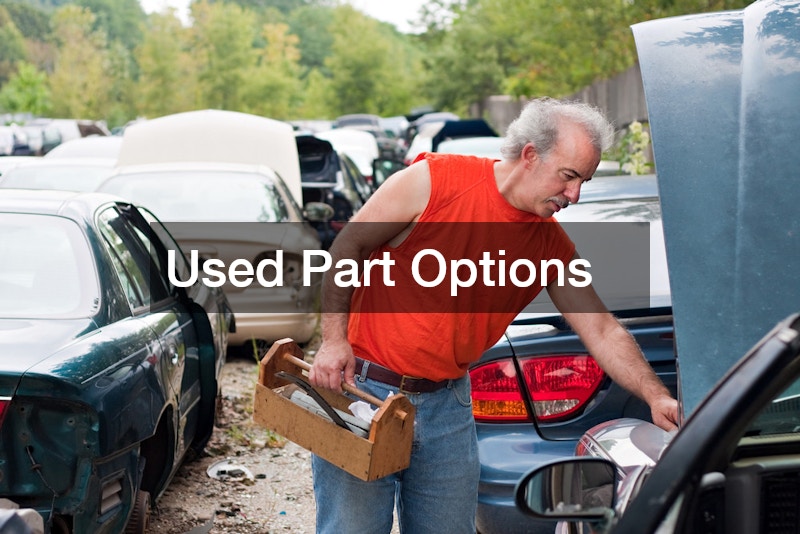Need to Call a Mechanic? Your Guide to Auto Repair Facilities


When your car starts making unfamiliar noises, a dashboard light flashes, or it simply won’t start, the first question most drivers face is whether it’s time to seek professional help. Today’s vehicles are complex machines that require expert care to keep them running smoothly and safely. Knowing where to turn when something goes wrong can save you time, money, and frustration. That’s where understanding the different types of auto repair facilities and what they offer becomes essential. Whether you’re dealing with a mysterious mechanical issue, physical damage after an accident, or just trying to keep your vehicle looking its best, choosing the right shop can make all the difference.
We’ll walk you through ten key categories of automotive service facilities—from the ones that handle general repair needs to those that offer specialized attention for issues like dents, tires, and vehicle electronics. You’ll learn what each type does, when you might need their help, and how they fit into the broader landscape of vehicle care. Along the way, we’ll explore situations where reaching out for professional help is your best option and how to recognize the signs that your vehicle needs more than just a quick fix. This guide is your comprehensive overview of modern vehicle service facilities—a resource to help you navigate the challenges of auto maintenance and make informed decisions when trouble strikes.
Fix-It Basics
Vehicle maintenance is a fundamental responsibility for every car owner, and general auto repair shops are usually the first place people turn when something goes wrong. These facilities handle a wide range of problems, from routine oil changes and brake checks to engine diagnostics and system replacements. They’re often seen as the go-to solution because they’re equipped to manage both minor and moderate mechanical concerns efficiently. Choosing a well-reviewed shop that handles general automotive needs is essential to keeping your car running reliably over the long term.
When your car starts making strange noises or your dashboard lights up with unfamiliar warnings, it may be time to visit a general repair facility. These shops have mechanics trained to use specialized tools to troubleshoot your car’s performance issues. They can evaluate engine health, check fluid levels, test battery voltage, and assess whether deeper repairs are needed. If you’re unsure where to begin or what might be wrong, this type of shop is often the safest starting point before you call a mechanic for more focused support.
Additionally, many general service shops now offer digital diagnostics and can even integrate service records into an app for easier access and scheduling. This evolution in technology makes it easier than ever to manage your vehicle’s needs. By using a shop that offers both traditional services and digital efficiency, you ensure your car receives up-to-date attention while also keeping your maintenance history organized. This is the first step toward making educated decisions about how and where to get help.
Body Shop Visits

Auto body service providers specialize in fixing cosmetic and structural damage resulting from accidents, harsh weather, or simple wear and tear. While your vehicle may still run after a collision, its appearance and structural integrity could be compromised. That’s where auto body shops step in, using their expertise in painting, welding, and frame straightening to restore the car’s look and safety features. It’s important not to overlook the role aesthetics play—not just in resale value, but also in overall driving confidence.
If your car has been involved in an accident, even a minor one, you’ll want professionals who focus on restoring the vehicle’s external components. Body shops use precision tools to match paint colors, smooth out panels, and realign parts to their factory settings. They often work closely with insurance providers and estimators to document the work, making them a practical option when navigating a post-accident claim. Knowing when to call a mechanic versus when to go straight to a body shop can save time and improve results.
Beyond appearance, proper bodywork ensures structural stability. Modern vehicles are designed with crumple zones and reinforced pillars that absorb impact in specific ways. If these are bent or out of alignment, they could compromise passenger safety during future incidents. Quality body shops are trained to detect and correct these deeper concerns, not just slap on a coat of paint, making them indispensable in the complete care of your vehicle.
Common Car Issues
From worn-out brakes to leaky radiators, everyday vehicle issues often require professional diagnosis and action. Though some car repairs may seem simple, such as replacing a headlight or swapping out windshield wipers, others involve complex systems like fuel injection or suspension components. Understanding how to address these issues before they become major problems can keep your car running smoothly and your expenses manageable. It also helps you decide whether the repair is something you can tackle yourself or if you need to call a mechanic.
For example, if your engine is overheating, it could be due to a malfunctioning thermostat, a clogged radiator, or a faulty water pump. Each of these issues requires different tools and technical knowledge to repair properly. The same goes for brake problems, where squealing noises or reduced stopping power could indicate anything from worn pads to a failing master cylinder. A repair shop that handles general and advanced tasks ensures these systems are fixed with care and precision.
The key to staying ahead of common car problems is routine maintenance. But when those efforts fall short—or when symptoms pop up without warning—knowing where to turn is essential. Building a relationship with a trusted repair facility helps you feel confident in their recommendations, get timely estimates, and keep your car on the road without unnecessary delays or expenses.
Check Engine First

When that dreaded “check engine” light flicks on, it’s easy to panic—or worse, ignore it. That light is your car’s way of communicating that something is off, and modern vehicles use intricate onboard computers to detect irregularities. Auto diagnostic tools plug into your car’s system to interpret these signals and pinpoint specific issues. This process saves time, reduces guesswork, and ensures repairs target the actual problem instead of chasing symptoms.
Diagnostic scans can detect misfires, faulty oxygen sensors, emissions issues, and more. These problems aren’t always visible or immediately felt while driving, which makes diagnostic equipment so vital. Many auto shops offer this service upfront, either as a standalone scan or as part of a comprehensive inspection. If your dashboard is lighting up with strange symbols, don’t wait—call a mechanic or visit a facility with the proper tools to assess what’s going on beneath the surface.
Advanced diagnostic tools can even generate reports to help mechanics and drivers plan for future repairs or monitor long-term vehicle health. Whether it’s a small sensor or a critical engine component, accurate diagnostics are the foundation of proper maintenance. This ensures that you’re not replacing parts unnecessarily and that your vehicle’s systems are working in harmony.
Steering Straight
Driving in a straight line should be effortless, but if your steering wheel pulls to one side or your tires wear unevenly, it might be time for a wheel alignment. Proper car alignment is vital for both safety and efficiency, as it affects how your tires make contact with the road and how the vehicle responds to steering input. Misaligned wheels can also decrease fuel efficiency and increase the likelihood of a blowout.
Alignment services measure the angles of your tires—called camber, caster, and toe—and adjust them to manufacturer specifications. This ensures even tire wear and consistent vehicle performance. Many drivers don’t realize how crucial alignment is until their tires need replacement prematurely. So if your ride feels off-center or you’re fighting the wheel to stay straight, it’s wise to call a mechanic who specializes in alignment services.
The good news is that alignment checks are relatively quick and inexpensive, especially compared to the long-term cost of neglected issues. Many facilities bundle alignments with tire rotations or suspension inspections. Taking action early can prevent additional damage and extend the life of your tires, saving you money while keeping your vehicle safe.
Ding & Dent Help

Small dents and dings may not affect your car’s function, but they can impact resale value and appearance. Whether caused by parking mishaps, hailstorms, or stray shopping carts, cosmetic imperfections are a common issue for vehicle owners. Fortunately, dent repair specialists can restore your car’s smooth look without requiring costly replacements or extensive paintwork.
Paintless dent repair (PDR) is a popular solution for minor dings. It involves massaging the metal from behind the panel to eliminate the dent without disturbing the original paint job. This auto dent repair technique is quicker, less expensive, and more environmentally friendly than traditional repairs. If you’re unsure whether your dent qualifies for PDR, it’s best to call a mechanic or repair specialist to evaluate it.
Choosing the right facility for dent work is important—look for technicians trained in modern methods and equipped with tools designed for precise repair. Don’t let minor cosmetic flaws go untreated; not only do they add up over time, but they also leave your car vulnerable to rust and further damage if not handled correctly.
Digital Checkups
Today’s vehicles operate like rolling computers, relying heavily on sensors and electronic systems. Advanced diagnostics play a pivotal role in identifying issues within these components, from faulty wiring to misbehaving modules. Unlike visual inspections, which can only go so far, digital diagnostics dig into the car’s electronic brain for detailed data.
Technicians use handheld scanners or tablets to communicate with your car’s control units, retrieving trouble codes that point to electrical, transmission, or engine malfunctions. For example, intermittent stalling or unusual idling may indicate electronic throttle or fuel delivery issues, which can be hard to diagnose without proper equipment. These are good moments to call a mechanic equipped with modern diagnostic gear.
Accurate diagnostics help reduce trial-and-error repairs, allowing for targeted solutions that fix the issue at its root. Whether it’s software updates or sensor recalibrations, electronic diagnostics ensure your vehicle runs with the precision and consistency today’s cars require.
Used Part Options

For budget-conscious car owners, buying new parts isn’t always feasible. Salvaged auto part shops offer a cost-effective alternative by supplying used or reconditioned components at a fraction of the price. These shops specialize in removing usable parts from vehicles that have been decommissioned or involved in accidents and reselling them to customers and repair shops.
If you need a replacement bumper, side mirror, or even an engine component, checking with a reputable salvage vendor can save you hundreds of dollars. Many of these parts come from newer vehicles with minimal wear. Before replacing a part, you might want to call a mechanic to confirm compatibility and condition. Some shops even test parts and provide limited warranties.
Using salvaged components is also an environmentally friendly option. By reusing working parts, you reduce waste and extend the lifecycle of existing materials. Always work with certified dealers to ensure you’re getting safe, inspected items that meet your vehicle’s needs.
Shine and Protect
A clean car isn’t just about appearances—it’s about preservation. Professional car detailing services go beyond basic washes by deep cleaning, polishing, and protecting your vehicle inside and out. This can make your car feel new again and guard against long-term wear from UV rays, salt, dirt, and debris.
Detailing includes interior shampooing, leather conditioning, exterior waxing, paint correction, and more. Whether you’re prepping your car for sale or simply maintaining pride of ownership, detailing helps retain value and aesthetic appeal. If your car is showing signs of wear, it might be the right time to call a mechanic or detailer to assess your options.
Frequent detailing can also uncover hidden problems, such as water leaks or carpet mold, before they escalate. Many facilities offer seasonal packages that target common issues based on climate, making it easy to maintain your vehicle’s condition year-round.
Tread Talk Tips
Tires are your vehicle’s only contact with the road, making their condition crucial to your safety. A dedicated tire dealer doesn’t just sell rubber—they inspect wear, balance tires, recommend the right type for your climate, and install them with precision. When your tread is worn or your car starts vibrating at high speeds, don’t wait to call a mechanic or visit a tire expert.
Many tire facilities also offer rotation, alignment, and balancing services that maximize the life of your tires. Choosing the right tires depends on your driving habits, terrain, and vehicle type. An experienced provider will guide you through performance ratings, seasonal differences, and warranty options, ensuring you get the best value for your investment.
Keeping up with tire maintenance helps improve fuel efficiency, handling, and braking performance. Don’t leave your tire care to chance—partner with a knowledgeable dealer who prioritizes safety and longevity.
When something goes wrong with your vehicle, knowing where to turn can feel overwhelming. There are so many options available today—from shops that specialize in diagnostics and electronic repairs to those that focus purely on aesthetics, tires, or structural issues. That’s why having a well-rounded understanding of our local auto repair facilities is so important.
Every type of repair facility has its place. If your engine isn’t running right, a diagnostic-focused service can pinpoint the problem quickly. If you’ve been in a fender bender, a body shop is essential. Tire problems? Visit a trusted dealer. And when your car just doesn’t look or feel quite right, detailing or alignment services may be the solution. These businesses work in tandem to keep your car operating at its best and your confidence behind the wheel intact.
Understanding these distinctions empowers you to act quickly and wisely. Instead of panicking when a dashboard light pops on or a strange noise develops, you can assess the situation and take the most effective next step. Whether it’s a general fix-it shop, a specialist for dents, or a shop that sources used parts, you now have the framework to make informed, cost-conscious decisions. Keep this guide handy and get familiar with the services in your area so that when the time comes to call a mechanic, you’re already one step ahead.


